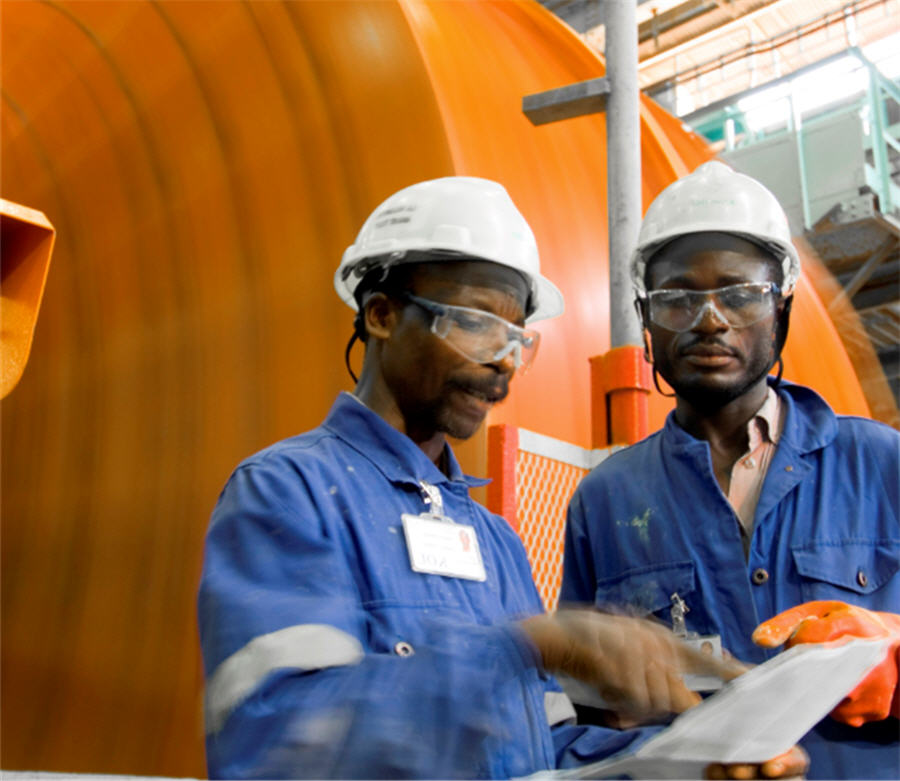Reuters | January 14, 2025 |

Workers in front of cascade mill, Kamoto Mine – Image courtesy of Katanga Mines
The Democratic Republic of Congo, the world’s top cobalt supplier, is courting new mining investors from Saudi Arabia to help it diversify and curb overreliance on companies from China, Marcellin Paluku, a senior government official, told Reuters.

Congo, which is also rich in copper and other critical minerals, wants more partnerships with the new investors to limit the risk of relying solely on Chinese investors, Paluku, who is a deputy cabinet director in the ministry of mines, said.
Chinese companies, some of which are state-backed, have over the past years emerged as the biggest investors in Congo, ramping up investment and production for copper and cobalt.
CMOC sets cobalt production record in 2024
CMOC Group is now the world’s biggest cobalt miner as it boosts output at Tenke Fungurume mine it bought from US-based Freeport-McMoRan in 2016.
Paluku said Chinese investors’ dominant role in the sector now presents a “risk” to the country’s economy.
“Today, 80% of our mines, it’s with one partner (China). So it’s a risk,” Paluku told Reuters in an interview on the sidelines of a mining conference in Riyadh.
“You never know what can happen…So that means we are now trying to diversify our partnerships so we don’t rely on only one partner.”
Congo is also courting investors from the European Union and India, Paluku said. The country is seeking to move away from current joint ventures which are heavily skewed in favour of investors, he added. “We are talking to all the people who are open to do business with us,” Paluku said.
(By Pesha Magid and Felix Njini; Editing by Ros Russell
Reuters | January 15, 2025 |

Stock image.
A Congolese court has sentenced three Chinese citizens to seven years in prison after they were arrested in possession of gold bars and $400,000 in cash and found guilty of illegal activities linked to the artisanal mining sector.

The trio are the first Chinese nationals to stand trial since Democratic Republic of Congo launched its latest push to crack down on the unlicensed extraction of the many precious and strategic minerals buried in its conflict-torn east.

“This is an educational trial that should normally serve as a wake-up call to all Chinese nationals who think they can leave China, arrive in Kitutu, Kibe, Lugushwa, Kamituga or Mwenga and behave as if they were in their own room, without even paying the hotel fees,” said Christian Wanduma, a lawyer representing local communities in the trial.
The judge in a court in Bukavu, the capital of eastern South Kivu province, found the defendants guilty on Tuesday of money-laundering, illegal purchase and possession of mineral substances, and other charges.
In addition to the prison sentence, the judge ordered them to pay a fine equivalent to $600,000, and permanently banned them from Congo once their sentences are served.
He acquitted them of charges including fraud and illegal mineral extraction for lack of evidence. The defendants had pleaded guilty to four of the seven charges against them, but said throughout the trial that they had not known they were breaking Congolese law before they were arrested on Jan. 4.
Their lawyers said they would appeal the ruling.
Congo has struggled to stop unlicensed companies and local armed groups exploiting its rich reserves of cobalt, copper, gold and other minerals.
Protesters took to the streets of Bukavu last week after Chinese men arrested on suspicion of illegal mining in a separate case were released.
“Our minerals are being plundered by companies that are mostly Chinese-owned and our people remain in extreme poverty, the roads are very dilapidated, we have difficulty accessing drinking water, health care, education, electricity, employment,” civil society leader Nene Bintu said at the demonstration.
“This situation has gone on for too long and must end now.”
In 2021, the authorities banned six small Chinese-owned mining companies, who it accused of operating illegally.
(By Crispin Kyala, Sonia Rolley, Alessandra Prentice and Portia Crowe; Editing by Ros Russell)
No comments:
Post a Comment